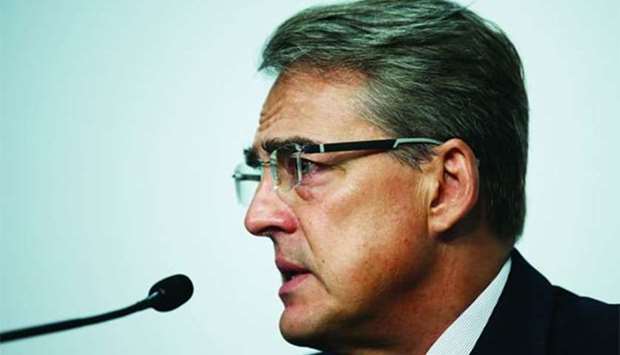IATA director general and CEO Alexandre de Juniac was all praise for Qatar for not burdening aviation with heavy taxes and said the sector’s growth in the country was because of its favourable policies.
“I urge countries around the world to lower the entire burden of taxes and charges on aviation if the sector is to grow,” de Juniac said at a media roundtable hosted by the International Air Transport Association for journalists from the GCC region in Sydney this week.
“If you examine countries where the aviation sector has grown, it is backed by favourable government policies including those on taxes. Qatar is a case in point, he said.
Highlighting headwinds to the airline industry mainly in view of “protectionism” by some major countries, the IATA chief executive officer said the “threat of a looming trade war, tariffs and other geopolitical risks were at risk of undermining the positive role that airlines play in the world.”
Asked whether he expected any favourable response from the “governments concerned”, de Juniac said, “We will keep exerting pressure on them…if we don’t, who else will?”
“We are at a juncture. Facts show that aviation has created immense value by bringing people, products and business together. And ultimately, I believe the enormous benefits of globalisation will guide us forward.”
He reiterated IATA’s long-held mantra of “aviation is the business of freedom”, and espoused the hard work done by airlines to become the facilitator of “more inclusive globalisation.”
De Juniac also called on governments to work together to create common standards around aviation security, and build stronger trust between the security arrangements of different nations.
“Despite the slower start, economic momentum is supporting rising passenger demand in 2018,’’ de Juniac said.
“That said, concerns over a possible trade war involving the US could have a serious dampening effect on global market confidence, spilling over into demand for air travel.”
De Juniac pointed out the current jet fuel prices have not yet translated into higher fares for air passengers.
“For the moment, the impact of higher fuel prices is not very significant. The industry has tremendously increased its resilience to shocks. But if the higher price regime stays, the situation can change. IATA, however, cannot intervene in such a situation … it is for the individual airlines to decide on how to deal with the rising jet fuel price,” de Juniac said.
In its report at the World Air Transport Summit (WATS) on Monday, IATA said jet fuel prices are expected to jump nearly 26% this year and average $84 per barrel as IATA sees Brent Crude averaging $70/b in 2018.
This is up from $54.9 in 2017 (+27.5%) and IATA’s previous 2018 expectation of $60 a barrel.
This year IATA forecasts the airlines fuel bill will rise to $188bn, which will represent 24.2% of average operating costs.
Fuel costs will account for 24.2% of total operating costs (up from a revised 21.4% in 2017), showed an IATA report presented at the World Air Transport Summit (WATS) in Sydney this week.
Overall unit costs are forecast to rise 5.2% this year, after a 1.2% increase in 2017; a significant acceleration, the report said.
“If you examine countries where the aviation sector has grown, it is backed by favourable government policies including those on taxes. Qatar is a case in point, he said.
Highlighting headwinds to the airline industry mainly in view of “protectionism” by some major countries, the IATA chief executive officer said the “threat of a looming trade war, tariffs and other geopolitical risks were at risk of undermining the positive role that airlines play in the world.”
Asked whether he expected any favourable response from the “governments concerned”, de Juniac said, “We will keep exerting pressure on them…if we don’t, who else will?”
“We are at a juncture. Facts show that aviation has created immense value by bringing people, products and business together. And ultimately, I believe the enormous benefits of globalisation will guide us forward.”
He reiterated IATA’s long-held mantra of “aviation is the business of freedom”, and espoused the hard work done by airlines to become the facilitator of “more inclusive globalisation.”
De Juniac also called on governments to work together to create common standards around aviation security, and build stronger trust between the security arrangements of different nations.
“Despite the slower start, economic momentum is supporting rising passenger demand in 2018,’’ de Juniac said.
“That said, concerns over a possible trade war involving the US could have a serious dampening effect on global market confidence, spilling over into demand for air travel.”
De Juniac pointed out the current jet fuel prices have not yet translated into higher fares for air passengers.
“For the moment, the impact of higher fuel prices is not very significant. The industry has tremendously increased its resilience to shocks. But if the higher price regime stays, the situation can change. IATA, however, cannot intervene in such a situation … it is for the individual airlines to decide on how to deal with the rising jet fuel price,” de Juniac said.
In its report at the World Air Transport Summit (WATS) on Monday, IATA said jet fuel prices are expected to jump nearly 26% this year and average $84 per barrel as IATA sees Brent Crude averaging $70/b in 2018.
This is up from $54.9 in 2017 (+27.5%) and IATA’s previous 2018 expectation of $60 a barrel.
This year IATA forecasts the airlines fuel bill will rise to $188bn, which will represent 24.2% of average operating costs.
Fuel costs will account for 24.2% of total operating costs (up from a revised 21.4% in 2017), showed an IATA report presented at the World Air Transport Summit (WATS) in Sydney this week.
Overall unit costs are forecast to rise 5.2% this year, after a 1.2% increase in 2017; a significant acceleration, the report said.


